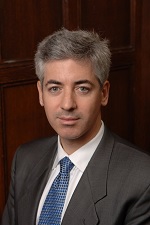 |
| Investor William Ackman |
Activist investor William Ackman has allied himself with biopharma raider Michael Pearson at Valeant ($VRX) in a bid to buy out Allergan ($AGN), the maker of Botox, which has been actively hunting down its own buyouts.
On Tuesday they announced a $46 billion takeover offer, combining $48.30 per share in cash plus a 0.83 share of stock, which they say is worth a combined $152.89 a share, well over the $116 price point when Ackman began accumulating his big stake. Valeant has already nailed down commitments from two big institutions to cover a multibillion-dollar cash component of the deal. And Valeant is ready to carve out $2.7 billion in costs once he gets his hands on Allergan.
"This proposal represents an undeniable opportunity to create extraordinary value for both
Allergan--which saw its stock climb past $166 a share today--later said it had received the offer and would consider it. Goldman, Sachs & Co. and BofA Merrill Lynch we brought in as advisors.
Activists like Ackman generally push the companies they're investing in to find a buyer, recouping big profits when successful. In this case, Ackman is coming allied to a buyer. Pearson has been building Valeant by aggressively hunting down, acquiring and then stripping down assets like Bausch & Lomb, looking to hack out any fat--and probably some muscle and bone--in order to make it all pay off. "We like companies that are fat, lots of costs that we can take out," he told Bloomberg recently. And Pearson has been outspoken about steering clear of R&D if possible, avoiding a field that Allergan has invested in heavily.
Allergan, though, is unlikely to be a willing partner to any buyout and analysts are expecting a knock-down, drag-out fight on this takeover effort. Allergan's best bet, says Sterne Agee analyst Shibani Malhotra, may be to use its considerable resources to buy something big, making a takeover too costly. "With over $3 billion in cash on hand as of 4Q2013, around $2 billion in debt, and an estimated free cash flow of $1.4 billion in FY 2014, Allergan is able to lever up and complete a sizable transaction," notes Malhotra.
If the Valeant bid is successful, Allergan won't come cheap. A premium price would require a high per-share bid in order to grab Allergan, which has a market cap of about $42 billion. After the market closed Monday evening Allergan's shares jumped about 12%, to about $158 a share.
A big merger like this would move Valeant into the big leagues in the pharma world, with a combined market cap that could range around $90 billion. In this case, a buyout would also likely lead to an abrupt sea change in R&D strategies for Allergan's team.
Over the course of last year Allergan joined the blockbuster R&D club in biotech, boosting research spending by about $85 million to $1 billion. Over the same period its research staff swelled by about 500, to approximately 2,500. Allergan CEO David Pyott told FierceBiotech at the J.P. Morgan conference in January that the company will add hundreds more investigators as it looks to boost its total research allocation to $1.5 billion over the next 5 years. And a confident Pyott added that he's ready and willing to spend billions more to cover the cost of new acquisitions and pacts aimed at expanding the company's core research focuses--while pondering the addition of a new drug category to the list of 5 core focuses if the opportunity looks right.
Allergan has done a number of deals in the past few years, from a $275 million deal to buy Vicept and an experimental rosacea therapy to a $65 million upfront to license in next-gen botulinum toxin candidates at South Korea's Medytox last fall. Pyott was planning a broad array of big as well as small deals, adding that with some near-term approvals likely, he's willing to take on some increased risk in terms of the experimental products he wants to add.
The bulk of Allergan's R&D operations are in Irvine, CA, where the company is based. But the company has been adding staffers in Bridgewater, NJ. And while the company has been buying up new therapies, 2013 was not a smooth ride. In particular Allergan's announcement that two top late-stage programs--Darpin for macular degeneration (a potential rival to Regeneron's ($REGN) Eylea as well as Lucentis) and the hair-loss program for bimatoprost--were being delayed by a year or two as researchers felt the need to add to new mid-stage studies before jumping into Phase III.
- here's the release
- here's the story from the WSJ (sub. req.)